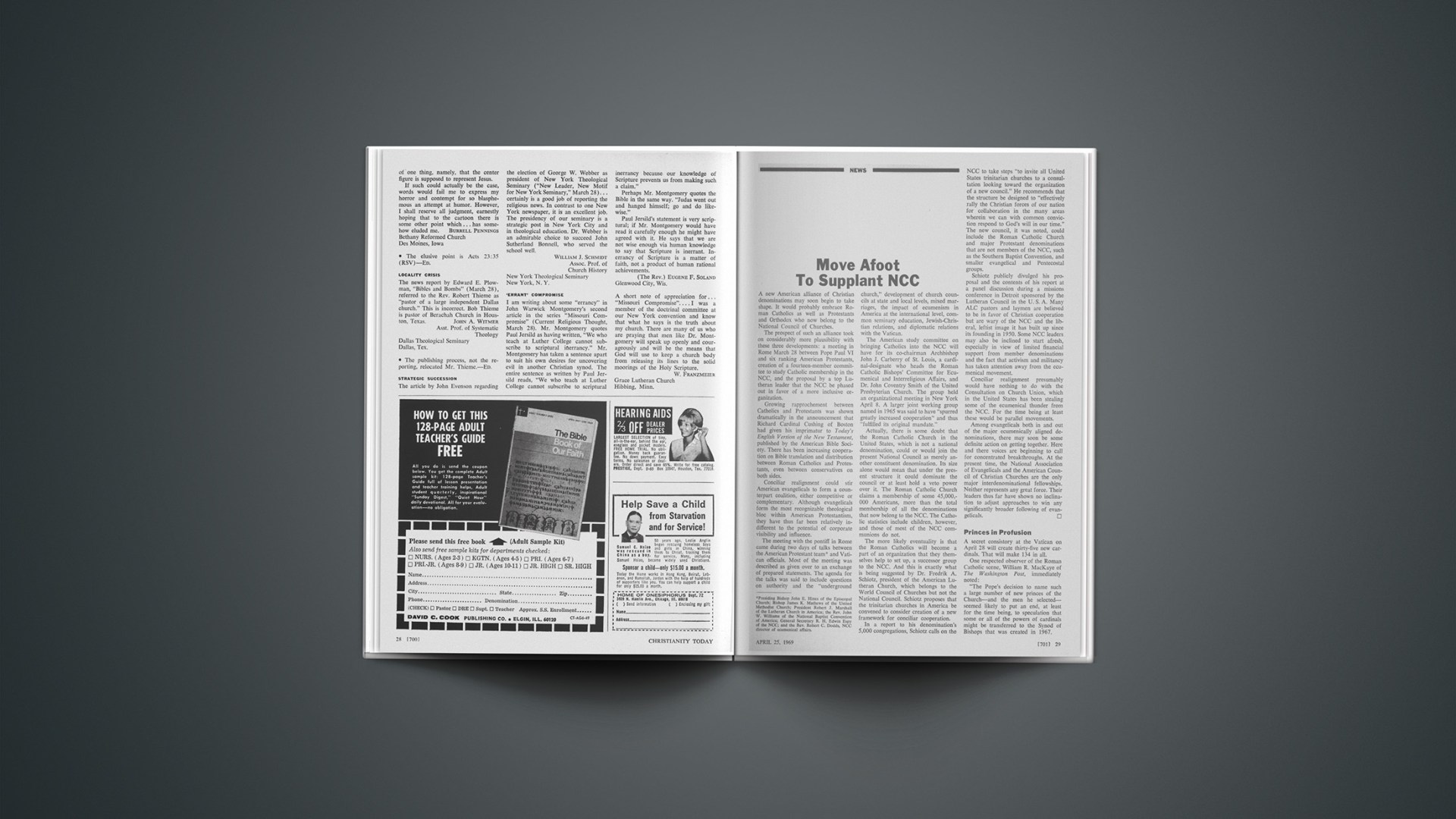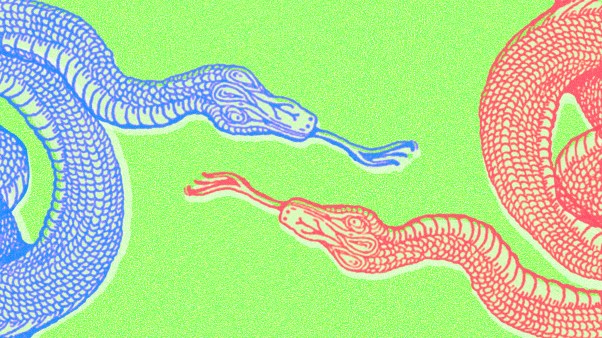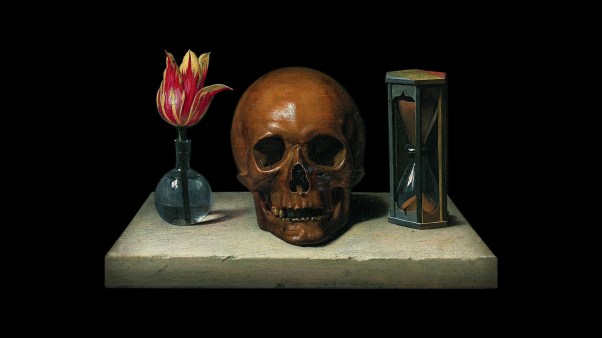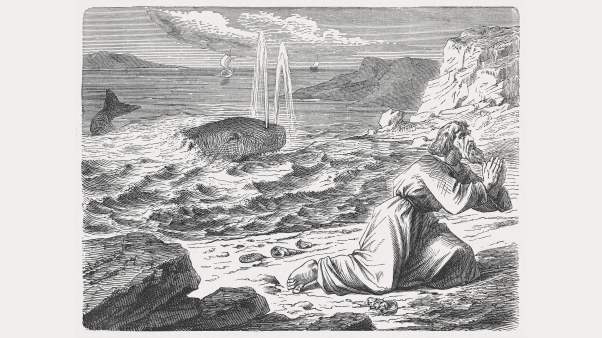A new American alliance of Christian denominations may soon begin to take shape. It would probably embrace Roman Catholics as well as Protestants and Orthodox who now belong to the National Council of Churches.
The prospect of such an alliance took on considerably more plausibility with these three developments: a meeting in Rome March 28 between Pope Paul VI and six ranking American Protestants, creation of a fourteen-member committee to study Catholic membership in the NCC, and the proposal by a top Lutheran leader that the NCC be phased out in favor of a more inclusive organization.
Growing rapprochement between Catholics and Protestants was shown dramatically in the announcement that Richard Cardinal Cushing of Boston had given his imprimatur to Today’s English Version of the New Testament, published by the American Bible Society. There has been increasing cooperation on Bible translation and distribution between Roman Catholics and Protestants, even between conservatives on both sides.
Conciliar realignment could stir American evangelicals to form a counterpart coalition, either competitive or complementary. Although evangelicals form the most recognizable theological bloc within American Protestantism, they have thus far been relatively indifferent to the potential of corporate visibility and influence.
The meeting with the pontiff in Rome came during two days of talks between the American Protestant team1Presiding Bishop John E. Hines of the Episcopal Church; Bishop James K. Mathews of the United Methodist Church; President Robert J. Marshall of the Lutheran Church in America; the Rev. John W. Williams of the National Baptist Convention of America; General Secretary R. H. Edwin Espy of the NCC; and the Rev. Robert C. Dodds, NCC director of ecumenical affairs. and Vatican officials. Most of the meeting was described as given over to an exchange of prepared statements. The agenda for the talks was said to include questions on authority and the “underground church,” development of church councils at state and local levels, mixed marriages, the impact of ecumenism in America at the international level, common seminary education, Jewish-Christian relations, and diplomatic relations with the Vatican.
The American study committee on bringing Catholics into the NCC will have for its co-chairman Archbishop John J. Carberry of St. Louis, a cardinal-designate who heads the Roman Catholic Bishops’ Committee for Ecumenical and Interreligious Affairs, and Dr. John Coventry Smith of the United Presbyterian Church. The group held an organizational meeting in New York April 8. A larger joint working group named in 1965 was said to have “spurred greatly increased cooperation” and thus “fulfilled its original mandate.”
Actually, there is some doubt that the Roman Catholic Church in the United States, which is not a national denomination, could or would join the present National Council as merely another constituent denomination. Its size alone would mean that under the present structure it could dominate the council or at least hold a veto power over it. The Roman Catholic Church claims a membership of some 45,000,000 Americans, more than the total membership of all the denominations that now belong to the NCC. The Catholic statistics include children, however, and those of most of the NCC communions do not.
The more likely eventuality is that the Roman Catholics will become a part of an organization that they themselves help to set up, a successor group to the NCC. And this is exactly what is being suggested by Dr. Fredrik A. Schiotz, president of the American Lutheran Church, which belongs to the World Council of Churches but not the National Council. Schiotz proposes that the trinitarian churches in America be convened to consider creation of a new framework for conciliar cooperation.
In a report to his denomination’s 5,000 congregations, Schiotz calls on the NCC to take steps “to invite all United States trinitarian churches to a consultation looking toward the organization of a new council.” He recommends that the structure be designed to “effectively rally the Christian forces of our nation for collaboration in the many areas wherein we can with common conviction respond to God’s will in our time.” The new council, it was noted, could include the Roman Catholic Church and major Protestant denominations that are not members of the NCC, such as the Southern Baptist Convention, and smaller evangelical and Pentecostal groups.
Schiotz publicly divulged his proposal and the contents of his report at a panel discussion during a missions conference in Detroit sponsored by the Lutheran Council in the U. S. A. Many ALC pastors and laymen are believed to be in favor of Christian cooperation but are wary of the NCC and the liberal, leftist image it has built up since its founding in 1950. Some NCC leaders may also be inclined to start afresh, especially in view of limited financial support from member denominations and the fact that activism and militancy has taken attention away from the ecumenical movement.
Conciliar realignment presumably would have nothing to do with the Consultation on Church Union, which in the United States has been stealing some of the ecumenical thunder from the NCC. For the time being at least these would be parallel movements.
Among evangelicals both in and out of the major ecumenically aligned denominations, there may soon be some definite action on getting together. Here and there voices are beginning to call for concentrated breakthroughs. At the present time, the National Association of Evangelicals and the American Council of Christian Churches are the only major interdenominational fellowships. Neither represents any great force. Their leaders thus far have shown no inclination to adjust approaches to win any significantly broader following of evangelicals.
Princes In Profusion
A secret consistory at the Vatican on April 28 will create thirty-five new cardinals. That will make 134 in all.
One respected observer of the Roman Catholic scene, William R. MacKaye of The Washington Post, immediately noted:
“The Pope’s decision to name such a large number of new princes of the Church—and the men he selected—seemed likely to put an end, at least for the time being, to speculation that some or all of the powers of cardinals might be transferred to the Synod of Bishops that was created in 1967.
“Most of those chosen for the cardinalate are so-called residential bishops who will not live in Rome after their elevation. Much of the agitation for enhancing the powers of the Synod of Bishops came from Roman Catholics who believe too much power is wielded in the Church by prelates who rarely leave the environs of Rome.”
Recent appointments to the college of cardinals have given some additional geographical spread. Even so, Italy still has forty-one members but only about 10 per cent of the total world constituency of the Roman Catholic Church. The European continent has about 42 per cent of the total Catholic population and some 68 per cent of the cardinals.
Among the four new Americans named, the biggest surprise was Bishop John J. Wright of Pittsburgh. Wright, 59, said to be a theological conservative and a social militant, is slated for transfer to the Curia in Rome.
The other Americans named were Archbishop Terence J. Cooke of New York, who at 48 becomes the youngest member; Archbishop John F. Dearden of Detroit, 60, who was the first president of the National Conference of Catholic Bishops; and Archbishop John J. Carberry of St. Louis, 65, who is the least known but has been active in ecumenical affairs.
Archbishop George B. Flahiff of Winnipeg also was named to the college, and there was speculation that he, like Wright, would be transferred to Rome. Scotland gets its first resident cardinal in more than 400 years in Archbishop Gordon J. Gray of St. Andrews and Edinburgh. And New Zealand wins its first representation in the college with Archbishop Peter T. McKeefry of Wellington.
Selection of Bishop Jan Willebrands of the Netherlands set off talk that he may succeed the late Augustin Cardinal Bea as head of the Vatican’s unity secretariat.
Pope Paul VI said that among the new cardinals were two whose names he held “in pectore” (in his heart) and would not immediately identify. The late Pope John XXIII named three this way and took their identities with him to his grave.
Pope Paul promulgated a new decree the day before Easter that does away with much of the ceremonial dress of the hierarchy. The traditional red hats of the cardinals are among the things that will be eliminated.
Paul’s pre-Easter messages included his most sober appraisals to date of the crisis of authority and doctrine in the Roman Catholic Church. He criticized those who “crucify” the church through defection and scandal and described the church today as the victim of a “practically schismatic ferment.”
Fidelity Under Fidel
Cuba’s evangelical churches are reported to be “full and growing.”
Lloyd Cross, Canadian secretary for the West Indies Mission, says he spoke twenty-one times in eleven churches during a recent visit to Cuba. Churches were filled for the services. One pastor told Cross that forty persons had confessed Christ during the previous two months.
“Cuba’s evangelical churches are not losing out,” says the April issue of the mission’s Whitened Harvest. An article written by Max Inglis and quoted in Missionary News Service indicated that restrictions on churches are rather rigid but that when stipulations are satisfied the congregations may function.
Cross reported that seventy-five churches are operating under the Evangelical Association, which is the group of churches brought into being by the mission. The association has nine students in its Bible school and six in its seminary.
Freedom Over-Priced
Young Ida Skripnikowa is a zealot of the Soviet “underground church,” a breakaway from the officially recognized Baptist Union. “Underground” believers look askance at those whom they consider their more submissive brethren in the Baptist Union. Despite an unprecedented four-day national conference in the Moscow church aimed at reconciliation, the breakaway group, said to be mostly of the younger set, would have no part of it. They say there can be no compromising with the atheistic system of Communism.
The Baptist Union worshipers feel the same way toward atheistic pressures, bearing in their body the marks of an unstinting testimony. But with them it is more a matter of reason, of co-existence. Although they do not have religious freedom as it is understood in most of the West, they nonetheless have more of it than the underground element, which keeps fast-stepping across the country to stay out of the hands of the militia.
Miss Skripnikowa hasn’t always made it to safety. At 27, she has been in and out of labor camps, spurning proffered freedom if she’d confess her guilt and recant her actions. “Freedom, of course, is a wonderful privilege, and I long for it. But seek it, I must not. Its high cost will be too enormous to bear. I am constrained to esteem the value of my soul higher than your offer of a conditional freedom,” she told the judge. Her bondage is spent incommunicado in a labor camp 1,000 miles from her native Leningrad.
As is true of many of the zealots and even some of the more restrained brethren, one of her main crimes was possessing contraband Russian Scriptures. Visiting Christians from outside the Iron Curtain add daily to the temptation for Soviet believers to violate the law, smuggling Bibles into the country. The paucity of Scripture supplies and hymnals sets up the challenge. Inevitably the government will be on hand to ensure that the law is upheld. Recently the government allowed the Baptist Union to print 20,000 Bibles and 26,000 hymnals.
Meanwhile, there are reports that “the miracle of West Germany’s economic recovery is matched by the evangelistic revival of the Germans living in Asia.” Estimates run that as many as nine million Germans live beyond the Urals, pushed here and there since the days of Czarina Katerina. Despite the lack of German Bibles, one observer reported, a wave of conversions and spirit of witness is stirring their settlements.
CIGARETTE SUBSTITUTE?
By year’s end, as many as seven million of the fifty million persons in the United States who smoke will try to give up the habit, but only 1.5 million will succeed. However, Daniel Horn of the Public Health Service’s National Clearinghouse on Smoking and Health is not pessimistic about the mild success. A constant decline in cigarette consumption that has held steady for two years now will give support to those trying to kick the habit, he says, “and the decline will accelerate.”
An earlier decline went up in smoke in 1964, after a nicotine scare that government health officials pumped into smokers wore off. But this time it is different. No big shock waves are going out. But anti-smoking forces are being persistent, sparking vigorous and apparently convincing campaigns, particularly on television. Personalities like Doris Day and Lawrence Welk refuse contracts promoting cigarettes. Tony Curtis is also on the campaign trail against them.
Horn even feels that perhaps some day smoking will be a hang-on habit of only a few of the middle-aged and older set. The Wall Street Journal quoted his perhaps wistful hope this way: “My guess is that smokers will drop to one-third of the population in about ten years. Eventually cigarettes will go the way of snuff.” Now, only 6 per cent of the population uses snuff.
But snuff went out, objectors point out, because there was a substitute for it—cigarettes. So where do they go from here?
Why Are Jews Successful?
A funny thing happened to man the other day on the way to racial equality. One of the world’s most respected thinkers asserted that Jews appear to be superior to all other peoples.
“Take any test of achievement you like—in any branch of science, mathematics, literature, music, public life,” said C. P. Snow. “The Jewish performance has been not only disproportionate, but almost ridiculously disproportionate.”
Snow is a British scientist and writer whose views on moral and ethical issues are widely honored. He is particularly celebrated for his observations on the disparity between the worlds of science and the humanities.
“Run your eye down the lists of Nobel Prize winners for the last twenty-five years,” Snow said. “You will find something between a third and a quarter have Jewish names.”
He added that “roughly the same astonishing performance turns up whatever kind of human excellence you examine.”
The 63-year-old scholar stopped short of giving assent to Old Testament identification of the Jews as God’s chosen people, but he did agree that his view presented a kind of “scientific Calvinism” regarding predestination. “There is no question Calvin had many things quite right,” he said.
Snow dropped his blockbuster in New York, where he delivered a founder’s day address at the New York School of Hebrew Union College-Jewish Institute of Religion. The school awarded him an honorary doctorate of humane letters. During a preconvocation press conference, he called for deep examination of genetic differences of racial and ethnic groups. While there is “a case against” this, he commented, “I cannot for the life of me see how you can just wish it away.”
The “optimistic liberal idea is that we should all become one completely—one collection—where discrepancies aren’t recognized. This doesn’t make sense. It seems to me to be liberal optimism gone mad.”
The tall, broad-shouldered Snow noted that Jewish environment makes for the utmost use of talent. “The very obvious truth that a Jewish person starts with two strikes against him means that he will struggle through where others don’t.” One can expect the “explosion of talent in due course to lose its force” in freer societies.
“Will that happen?” he asked. “Or is there something in the Jewish gene-pool which produces talent on quite a different scale from, say, the Anglo-Saxon gene-pool. I am prepared to believe that may be so.”
Snow underlined the importance of more research into the gene-pool theory. Why, for instance, do Negroes win all the “short events [sprints in track] and jumping.… when there can’t be more than forty million Negroes who have even had the chance at anything like serious athletic activity?”
Snow would not be drawn out on a discussion of Negro traits, however, or on the view of California psychologist Arthur Jensen that intelligence is largely hereditary and cannot be altered significantly by environment.
Snow said that if he had been born into Judaism, he would probably have preserved “some” ties with tradition. But as a “child of my time” he did not think he would be any more of a believer than he is now. He termed himself a “pious unbeliever” who was born into the Church of England in a secular age.










